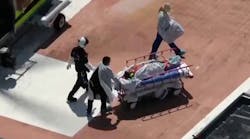We’ve all read the stories, followed the news, and sometimes even been privy to resulting video footage. You know the type of stories I’m thinking of and we know how most of these things will eventually play out in our camera-saturated, media-obsessed, hyper opinionated and bitterly divided reality; somewhere in America the police will go to a call, pull a stop, confront something suspicious – the sort of thing that happens countless times every day and everywhere – but with explosive results. In a flash, routine is shattered and a cop’s world will turn publicly and often controversially upside down.
For the better part of three years, in particular, we’ve seen case after case rise to prominence before being shoved out of the spotlight by the next. And for the better part of three years a lot of cops have been consumed with the gnawing dread of becoming the next YouTube example of “Cops Gone Wild!” to where policing has become predominantly reactive in many locales. For many officers the sense of emotional besiegement, public distrust, and loss of control leads to a “circle the wagons” mentality, a state that is never good for either police/community relations or their own psychological health. And in some of the hardest areas of the country most in need of strong, effective, proactive policing the cops have pulled back with arrests dropping and crime rising.
Whether or not the officers’ actions were or will ultimately be found justified, the fears and their consequences are real. In some of the prominent cases we’ve seen recently the force used or decisions made are, to us intimately involved in law enforcement, objectively justifiable and either have been, or are expected to be, ruled as such. The fact, however, is that not all of them are so easily justifiable. At the extreme end of things, officers have been indicted for charges up to and including murder. Of lesser but still significant concern, cops are facing discipline and/or litigation for allegations of overreaction, poor judgment, civil rights violations, and other accusations of misconduct. Even where officers’ actions have been internally or judicially justified, they face condemnation in the court of public opinion, and sometimes even among fellow officers and administrators.
So how do you avoid becoming the next pariah, either public or departmental? Of course there are no guarantees and, even if you do find yourself under a harsh spotlight, there is little you can do to influence public opinion. Sometimes violence erupts suddenly and unexpectedly and your reaction is all about mere survival and ending the attack NOW! And sometimes you can do everything right only to have a thoroughly justified response picked apart but those who weren’t there, couldn’t have handled being there, and would do everything in their power to never have to be there. But sometimes we do screw up, maybe just a little but with huge consequences, and in studying not just these high profile cases but also numerous “everyday” cases that didn’t end in deadly violence or public criticism but still could have gone much better (some of which I may have even wanted a “second take” for my starring role) I have noticed a trend. We can very often influence a more positive outcome by following a simple mantra:
JUST SLOW DOWN
The calls you go on and preexisting attitudes of the people involved are beyond your control; the public summons, the police respond, and the nature of any individual encountered when you arrive is of their own creation. How you respond to anything that happens once there is entirely in your control, and your potential influence over the outcome is great. Bad outcomes result when we move too quickly, speak or act impulsively or without considering all the possible consequences, become impatient, or let ego have any part in the decision making. (Again, I write from a position of experience, having had the privilege of kicking myself repeatedly for failing in each of these areas over more than two decades in policing)
Would Tamir Rice, Eric Garner, Samuel DuBose, or Terence Crutcher be alive today, and the officers involved in their deaths not be facing either criminal charges or civil litigation, had the officers slowed down just a little and given themselves space and time to formulate better tactics? Would Walter Scott have been picked up at his home later for the warrant that prompted him to run, and Officer Michael Slager still on the job rather than facing murder charges, had Slager simply called for backup and gave chase instead of reaching for his sidearm and then later altering a crime scene? Or what if he simply shrugged and thought, “I know who you are and I’ve got your car. Catch you later!”?
Those are just some of the high profile cases. Officers face criticism, complaints, second guessing, and legal actions every day arising from the choices they make in occasional haste. That is not to say most or even many of the complaints we face are justified – law enforcement will always be a lightning rod and the people cops deal with most are often society’s least reasonable – but sometimes they are. Sometimes in our haste, impatience, impulsivity, and (admittedly very large) egos we do screw up. We miss details, become lax about officer safety, react rudely to people needing compassion, or overestimate our ability to manage risk. And sometimes we get hurt or hurt others when we could have chosen a better path if we’d just slowed down a little.
In our next article we will look at some of the personal and situational factors that can lead us to reacting too quickly when slowing down is possible and advantageous. We’ll also discuss how to slow down when emotions are high and adrenaline pumping. In the meantime, stay safe, have fun, and Happy New Year!


